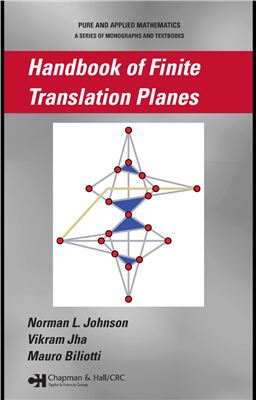Chapman & Hall/CRC, 2007. - 888 pages.
The Handbook of Finite Translation Planes provides a comprehensive listing of all translation planes derived from a fundamental construction technique, an explanation of the classes of translation planes using both descriptions and construction methods, and thorough sketches of the major relevant theorems. From the methods of Andrй to coordinate and linear algebra, the book unifies the numerous diverse approaches for analyzing finite translation planes. It pays particular attention to the processes that are used to study translation planes, including ovoid and Klein quadric projection, multiple derivation, hyper-regulus replacement, subregular lifting, conical distortion, and Hermitian sequences. In addition, the book demonstrates how the collineation group can affect the structure of the plane and what information can be obtained by imposing group theoretic conditions on the plane. The authors also examine semifield and division ring planes and introduce the geometries of two-dimensional translation planes. As a compendium of examples, processes, construction techniques, and models, the Handbook of Finite Translation Planes equips readers with precise information for finding a particular plane. It presents the classification results for translation planes and the general outlines of their proofs, offers a full review of all recognized construction techniques for translation planes, and illustrates known examples.
The Handbook of Finite Translation Planes provides a comprehensive listing of all translation planes derived from a fundamental construction technique, an explanation of the classes of translation planes using both descriptions and construction methods, and thorough sketches of the major relevant theorems. From the methods of Andrй to coordinate and linear algebra, the book unifies the numerous diverse approaches for analyzing finite translation planes. It pays particular attention to the processes that are used to study translation planes, including ovoid and Klein quadric projection, multiple derivation, hyper-regulus replacement, subregular lifting, conical distortion, and Hermitian sequences. In addition, the book demonstrates how the collineation group can affect the structure of the plane and what information can be obtained by imposing group theoretic conditions on the plane. The authors also examine semifield and division ring planes and introduce the geometries of two-dimensional translation planes. As a compendium of examples, processes, construction techniques, and models, the Handbook of Finite Translation Planes equips readers with precise information for finding a particular plane. It presents the classification results for translation planes and the general outlines of their proofs, offers a full review of all recognized construction techniques for translation planes, and illustrates known examples.

